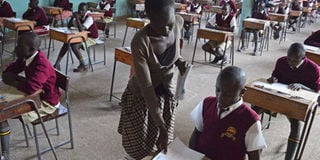Knec bans photocopying of test papers

Arya Primary School pupils sit for their mathematics paper during the start of the Kenya Certificate of Primary Education examination on October 31, 2017. PHOTO | ONDARI OGEGA | NATION MEDIA GROUP
What you need to know:
- The pictures of candidates and their names are also printed on the papers to eliminate impersonation.
- The circular points out problems experienced during the registration of KCPE and KCSE examination candidates in February.
The Kenya National Examinations Council (Knec) has banned the photocopying of test papers in a bid to safeguard the integrity of the national exams.
This means that candidates who fail to validate their data between today and Friday will not be allowed to sit the tests in November should there be any registration errors.
Head teachers will also be punished by their employer for such mistakes.
“Due to the threat of breach of security occasioned by the photocopying of examination papers, Knec is committed to ensuring clean registration data for the accurate packing of materials.
"On account of this, under protest cases will not be accepted. Only subjects captured in the nominal rolls will be offered to the candidate,” an April 12 circular signed by Knec Chief Executive Mercy Karogo and her Teachers Service Commission counterpart, Ms Nancy Macharia, addressed to education officials and school heads reads.
“Heads of institutions should take note that they will be held responsible and surcharged for errors in the registration data for the 2018 Kenya Certificate of Primary Education and Kenya Certificate of Secondary Education examination candidates.”
EXAMS
A total of 1,060,787 candidates have been registered for the KCPE exam, while some 663,811 will sit the KCSE test papers at the end of the year.
Last year, the question papers and answer booklets were combined to beat new cheats after it emerged that providing them separately led to collusion in some instances.
The pictures of candidates and their names are also printed on the papers to eliminate impersonation.
The circular points out problems experienced during the registration of KCPE and KCSE examination candidates in February.
“Most new schools wishing to be registered as Knec examination centres did not submit documents a year earlier as required, while many non-formal centres, especially in Nairobi, did not have registration certificates and could not be considered as Knec examination centres,” the circular reads.
CHALLENGES
It adds that some places in the Knec data base, which ceased to be examination centres due to inability to raise the required number of candidates, presented expired provisional certificates.
“Some candidates were not registered on time due to lack of birth certificates.
"Some new sub-counties did not submit the request for coding of examination centres on time. This led to schools registering using their old codes,” the two officials said.
Other challenges included failure to observe deadlines for the submission of nominal rolls by schools and unregistered centres lacking places to host them.
“The other [challenges] were candidates requesting for name, year of birth and gender amendments in the KCSE examination registration without amending the KCPE details first, and candidates who repeated in lower classes being declared as repeaters yet they have never sat the KCSE exam. This has affected the certification of such candidates,” the circular adds.
REGISTRATION
It also raises concern over the delay in seeking equation by foreign candidates, “which has led to failure by the candidates to sit the KCSE Qualifying Test, hence failure to register for the national examination despite them being in form four”.
The circular says some KCSE examination candidates gave wrong KCPE test details, while others registered for fewer subjects or for wrong subject clusters.
“There was a mix-up of candidates due to schools entering data using cyber café personnel. Some mixed up candidates from different schools,” the circular goes on.
“Schools erroneously registered candidates under the special needs category or did not submit required documents.
"There was double registration of candidates, while some schools were captured under wrong distribution centres.”





